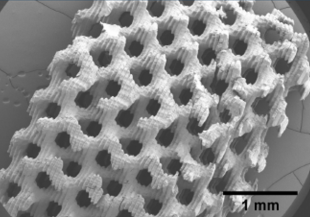Objective
The primary objective of this project is to develop custom 3D printed chromatography columns tailored for the efficient capture and purification of viral vectors, including lentivirus (LV) and adeno-associated viruses (AAV).
Background
Viral vectors are pivotal in the advancement of new-generation gene therapies. However, the bioprocessing industry still faces challenges in identifying and optimizing biomanufacturing processes for purifying LV and AAV. Prior research in our group has demonstrated the potential of 3D printing technology, achieving high-resolution and rapid purification with remarkable purity levels of approximately 90% in a single step. Nevertheless, obstacles persist in purifying large biomolecules crucial to biomanufacturing, primarily due to limitations in mass transfer within conventional porous devices, which hinder the binding of certain biomolecules.
Project Description
This proposed project aims to achieve a tenfold increase in separation times and binding capacities for viral carriers compared to conventional chromatographic resins. This will be accomplished by fine-tuning the printing ink composition, enhancing printing resolution, and designing custom column morphologies. Furthermore, the incorporation of novel chemical ligands with enhanced bioselectivity will enable the discrimination between biologically active viral vectors and their non-active counterparts.
Collaborative Exploration and Technology Transfer
The project will collaborate with Fujifilm Diosynth Biotechnologies UK, a leading bioprocessing organization. This collaborative approach ensures cutting-edge advancements in the field and seamless technology transfer into the biomanufacturing pipeline.
Implications for Biomanufacturing Industry
The successful implementation of this research will revolutionize viral vector purification in biomanufacturing. The technology developed can be widely applied to projects of interest to industries involved in biopharmaceutical development, significantly benefiting the healthcare sector and patients.
Conclusion
This ambitious PhD project represents a significant leap forward in biomanufacturing, harnessing the potential of 3D printing for enhanced viral vector purification. By overcoming current challenges and streamlining purification processes, this technology promises to positively impact biopharmaceutical production. The collaborative approach ensures cutting-edge advancements, further solidifying the industry's position as a leader in innovative bioprocessing technologies.
Further Information:
https://simonedimartinolab.eng.ed.ac.uk/
The University of Edinburgh is committed to equality of opportunity for all its staff and students, and promotes a culture of inclusivity. Please see details here: https://www.ed.ac.uk/equality-diversity
Closing Date:
Principal Supervisor:
Assistant Supervisor:
Eligibility:
Minimum entry qualification - an Honours degree at 2:1 or above (or International equivalent) in a relevant science or engineering discipline, possibly supported by an MSc Degree. Further information on English language requirements for EU/Overseas applicants.
Funding:
Tuition fees + stipend are available for applicants who qualify as Home applicants (International students can apply, but the funding only covers the Home fee rate)



